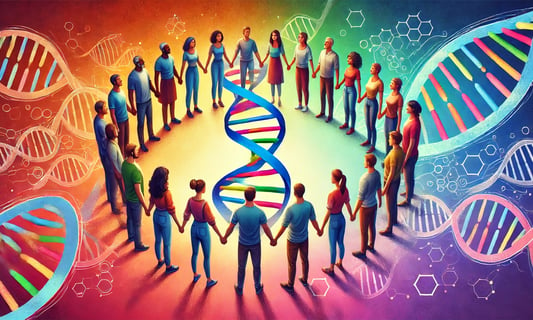How Do I Become A Genetic Counselor? Updated
Learn how to advance your career as a genetic counselor with tips on state licensure, specialization, continuing education, and exploring diverse job opportunities in the field.
CAREER ADVICEAPPLICATION HELPSCHOOL ADVICECAREER INFORMATION


How Do I Become A Genetic Counselor?
Key Takeaways
Start with a solid undergraduate foundation by majoring in a relevant field such as Biology or Psychology.
Pursue a Master’s degree in Genetic Counseling accredited by the ACGC, which includes essential clinical rotations.
Certification and licensure are necessary steps to practice as a genetic counselor.
Combat a low GPA by excelling in prerequisite courses and engaging in extracurricular activities to strengthen your application.
Introduction to Genetic Counseling
Genetic counseling is a rapidly growing field, where professionals guide individuals and families in understanding genetic conditions and their implications. As healthcare increasingly embraces personalized medicine, the role of genetic counselors becomes even more critical. For those interested in a career that combines science, empathy, and education, genetic counseling offers a fulfilling path.
Step 1: Earn a Bachelor’s Degree
The journey to becoming a genetic counselor begins with earning a Bachelor’s degree in a relevant field. Majors like Biology, Genetics, and Psychology are particularly beneficial. It’s essential to focus on courses such as Genetics, Molecular Biology, and Statistics to build a strong academic foundation. For more insights on the best majors for genetic counseling, check out this guide.
Beyond the classroom, gaining experience through internships, research opportunities, or volunteering in related settings can significantly bolster your resume. If you’re looking to shadow a genetic counselor, which can offer valuable insights into the profession, you can learn more about the process here.


Step 2: Obtain a Master’s Degree in Genetic Counseling
After completing your undergraduate degree, the next step is to earn a Master’s degree in Genetic Counseling from an ACGC-accredited program. This advanced degree typically takes two years and covers a comprehensive curriculum that includes:
Genetics and Genomics
Ethics in Genetic Counseling
Counseling Techniques and Psychosocial Aspects
An integral part of the Master’s program is clinical rotations, where you’ll gain hands-on experience in different areas, such as prenatal, pediatric, and cancer genetics. These rotations are essential for developing practical skills and gaining exposure to various genetic conditions. To learn more about what different programs offer, visit this resource.
Step 3: Gain Clinical Experience
Clinical experience is a cornerstone of genetic counseling education. During your Master’s program, you’ll complete clinical rotations under the supervision of certified genetic counselors. These rotations not only enhance your understanding of genetic disorders but also refine your counseling skills, preparing you to handle real-life cases with confidence.
Additionally, internships or volunteer opportunities in genetics clinics or labs can further enrich your experience. Demonstrating your ability to apply theoretical knowledge in practical settings will make you a more competitive candidate in the job market.


Step 4: Pass the Certification Exam
After earning your degree, the next milestone is to pass the American Board of Genetic Counseling (ABGC) certification exam. This exam is critical for becoming a Certified Genetic Counselor (CGC) and is often a prerequisite for state licensure.
The ABGC exam covers a range of topics, including genetic principles, counseling skills, and ethical considerations. To prepare effectively, consider reviewing materials provided by your graduate program, and exploring resources from the National Society of Genetic Counselors (NSGC).






Step 5: Obtain State Licensure (if required)
In the U.S., many states require genetic counselors to be licensed. The licensure process typically involves passing the ABGC certification exam and meeting specific educational and clinical experience criteria. Licensing requirements vary by state, so it’s essential to check with your state’s licensing board or refer to resources from the NSGC for specific guidelines.
Step 6: Consider Specializations
Genetic counseling offers various specialization opportunities, allowing professionals to focus on specific areas such as prenatal, pediatric, cancer, cardiology, or neurology genetics. Specialization may require additional training or experience but can significantly enhance your expertise and career prospects.
For example, those interested in cancer genetics might seek additional certification in oncology, while someone focusing on prenatal genetics might benefit from further coursework in maternal-fetal medicine. Continuous education and staying updated with the latest advancements in your chosen specialization are crucial for long-term success.


Step 7: Join Professional Organizations
Joining professional organizations, such as the NSGC, provides numerous benefits, including networking opportunities, access to continuing education, and resources to stay updated on industry standards and practices. Being part of such a community can also open doors to job opportunities and collaborations that might not be accessible otherwise.
Step 8: Pursue Continuing Education
Genetic counseling is an ever-evolving field, with new research and technological advancements continually emerging. To maintain your certification and stay at the forefront of the profession, pursuing continuing education is essential. This might include attending conferences, participating in workshops, or enrolling in online courses.
Some states may require continuing education for license renewal, so it's important to stay informed about these requirements and proactively seek out learning opportunities.


Step 9: Explore Career Opportunities
Genetic counselors can work in a variety of settings, including hospitals, clinics, research institutions, and biotechnology companies. There are also opportunities in public health, education, and policy development. Whether you choose to work directly with patients or in a more research-oriented role, the field offers a range of career paths to explore.
For a detailed look at the diverse tasks that genetic counselors handle daily, you can explore this article.
Enhancing Your Genetic Counseling Career


How to Combat a Low Overall GPA
If your overall GPA is not as strong as you’d like, there are several strategies to enhance your application to a genetic counseling program. One effective approach is to excel in prerequisite courses, particularly those required for graduate school admission. Strong performance in these courses can demonstrate your academic potential and help offset any earlier academic shortcomings.
Additionally, engaging in extracurricular activities such as volunteer work, internships, or independent projects can showcase your commitment to the field and your leadership abilities. Highlighting these experiences in your application, along with any personal qualities that contribute to your suitability for genetic counseling, can make a significant difference in your acceptance prospects. For more tips on how programs evaluate applicants, visit this guide.




